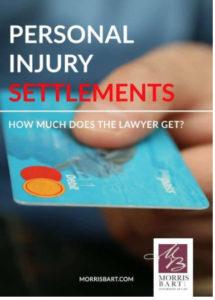
A demand letter is the paperwork sent to an insurance company or liable party outlining an accident, who is legally responsible, and the value of the victim’s claim. This document usually begins settlement negotiations after a car accident or other personal injury.
Knowing what a demand letter is allows you to better understand the insurance claims process. This knowledge is essential whether you manage your own claim or work with an attorney who will handle the process on your behalf.
What Is the Purpose of a Demand Letter?
A demand letter is an attempt at resolving a dispute outside of court. By explaining the case against the recipient, providing evidence, and demanding a fair payout, you can show the at-fault party or their insurer that you do not want to sue them but will if they do not take your case seriously.
The information included in a demand letter usually includes:
- A brief, general explanation of the accident and injuries
- The demand of a specific payout in the case
- A deadline
- The legal justification for demanding the compensation
- What will happen if they do not pay the requested money damages
Are Demand Letters Successful?
Demand letters are usually successful in that most cases never require a lawsuit or go to trial. The insurance company representing the liable party generally agrees to an out-of-court settlement, and the claimant receives a check.
However, the money recovered may not be the amount demanded. While the letter kicks off the settlement negotiation process, it is not unusual for there to be a lot of disagreements and fact-finding before the two parties reach an agreement on the case’s value.
For a free legal consultation, call (800) 537-8185
What Happens Before You Can Send a Demand Letter?
Before you or your attorney can send a demand letter, you must have a complete understanding of your accident, injuries, damages, and value. This means you must first:
- Investigate what happened and compile evidence to support your claim
- Reach maximum medical recovery or have an understanding of your injuries and lasting impairments from the accident
- Document your accident- and injury-related expenses and losses
- Value your current, future, and intangible damages
While most of these steps sound fairly straight-forward, it is crucial not to underestimate the importance of knowing:
- Your lasting injuries and how they will affect your life
- Your ongoing and future care needs and expenses
- The value of your intangible losses, such as pain, suffering, and emotional distress
Getting this information may require enlisting experts and working with medical specialists. It also helps to have an attorney on your side that understands how courts in your area handle non-economic damages.
What Happens After You Send a Demand Letter?
After sending a demand letter, usually by Certified Mail, you wait. The insurance company or individual will receive the letter and has until the deadline you set to respond. They may:
- Look into the incident
- Contact you for more information
- Take other steps to determine their legal responsibility and how much they owe
Once they are ready to respond, you can expect a counter-offer. This will likely be much too low to be fair based on the injuries and damages you sustained. However, this is not the end of the line. Instead, it begins the negotiation process; most cases settle after several back-and-forth offers and counter-offers.
Common ground is possible in most cases. If not, you can sue and ask the judge and jury to determine the award amount. Most insurers and liable parties want to avoid the time and financial investment required to go to court, which often forces them to reach a settlement agreement.
Click to contact our personal injury lawyers today
An Attorney’s Role in the Insurance Claims Process
The best way to ensure a demand letter works is to use a personal injury attorney on your case. Accident law firms create and send demand letters on behalf of clients in almost every case they handle. This is a regular part of the insurance claims process.
Your lawyer will investigate the crash, gather evidence, develop a strong argument, and demand the appropriate payout based on the acceptable settlement range of the case. Then, they manage the negotiations. If the insurer refuses a settlement, they may sue on your behalf.
The deadlines for suing vary by state. In the Gulf South, these include:
- Two years in Alabama per Ala. Code § 6-2-38
- Three years in Arkansas per Ark. Code Ann. § 16-56-105
- One year in Louisiana per La. Civ. Code Art. 3492
- Three years in Mississippi per Miss. Code Ann. § 15-1-49
Other factors in the case could alter these deadlines, so act quickly.
Speak to a Lawyer from Morris Bart, LLC About Your Case for Free
You can speak with a personal injury lawyer from the Morris Bart law firm about your injury case today for free. The areas we serve include Alabama, Arkansas, Louisiana, and Mississippi. Call (800) 537-8185 to learn more.
Questions?Call (800) 537-8185
to find a Morris Bart office near you.





